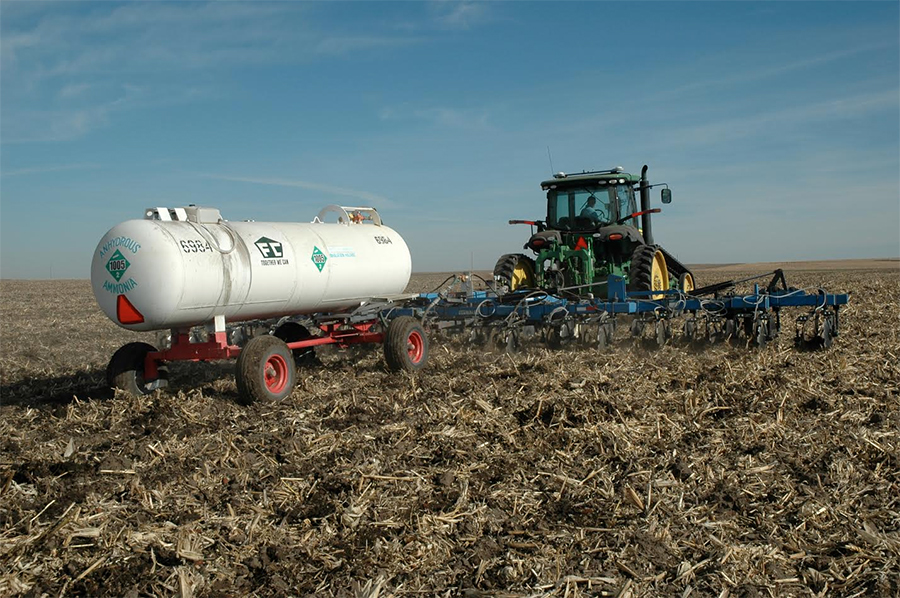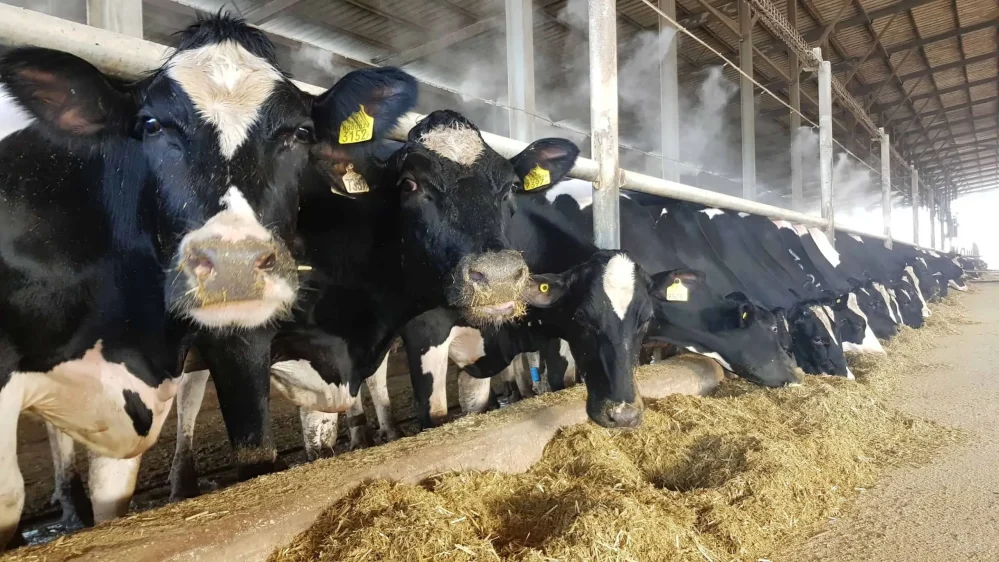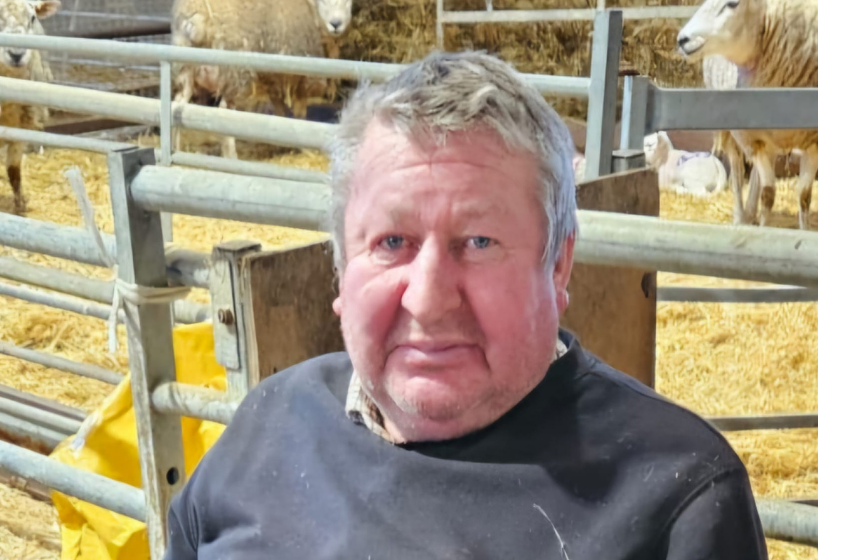Farming
NFU Cymru President’s New Year message

NFU Cymru President John Davies provides his New Year message, looking back over an unprecedented 12 months and assessing what lies ahead in 2021.
“2020 was a year the likes of which we’ve never seen. The Coronavirus pandemic has challenged all of society. My condolences go out to all of those who’ve lost loved ones to this disease. My thoughts are with all whose livelihoods have been affected by the knock-on effects that the pandemic has had on businesses and our general way of life. I’d like to place on record my heartfelt thanks to our NHS workers and those supporting them on the front line for their courage in tackling this global health emergency. So often the term ‘hero’ is attached to those in films or on the sporting stage, but if this year has taught us anything it’s that, in fact, the real heroes are those people in our communities who have gone to work – putting themselves at risk – to care for the sick and keep the rest of us safe. Diolch yn fawr iawn pawb.
“The initial impact of the Covid-19 outbreak and the overnight closure of the hospitality sector had severe consequences for the food supply chain. The resilience of those systems was stretched to the limit as the supply chain frantically sought to redirect produce that would usually be destined for the out-of-home market to the retail sector, where panic-buying had resulted in empty shelves in many stores. I thank all our farmers who have worked throughout the chaos of the Covid-19 fallout to keep the nation fed. I know that for many businesses and sectors this hasn’t always been easy and some experienced significant losses as those supply chains struggled to adapt to new demands. However, the role the entire industry has played during such a fraught period will live long in the memory of many, and indeed recent polls suggests farmers’ favourability with the consumer is higher than it has been in a decade.
“I very much hope that lessons can be learned from this tumultuous year and if the past few months have taught us anything, it’s that the safe, reliable supply of high quality affordable food is now of paramount importance to the public. As farmers we are ready and committed to ensuring that the nation remains fed during this difficult time and through future challenges, too. Our farming systems, underpinned by a fantastic, natural asset base, mean we are well equipped to be the providers of the most climate friendly food in the world. NFU Cymru will continue to lobby Welsh Government to see the importance of food production recognised and protected as a cornerstone of future policy.
“Looking ahead and, with significant changes to how Wales and the UK trades with the EU and the rest of the world, one of the biggest challenges for 2021 is going to be making sure that Welsh farmers have the widest possible range of markets freely open to them, on the best possible terms. We are, of course, relieved that that a deal has finally been agreed between the UK and the European Union, providing some much-needed certainty for the farming sector and allowing Wales’ farmers to continue to send products to the EU27 free of both tariffs and quotas. All efforts must be now be focussed on finding ways of minimising the impact of red tape on the movement of our produce to the EU.
“A heartfelt thanks must go to the one million people from all walks of life who backed our food standards campaign. Their support was instrumental in delivering legislation to ensure that food standards will now have a ‘stronger voice in UK trade policy’.
“Of course, away from the pandemic and agricultural policy, there are still major issues that are affecting the nation’s farmers every day. Bovine TB continues to blight so many businesses across Wales – all too many times this year I have again learned of families’ heartbreak and herds, generations in the making, being decimated due to this horrific disease. Please be assured that NFU Cymru will continue to pressure government to act upon the science and take notice of the proven strategies adopted by so many other countries – an approach that seeks to tackle bovine TB across all its vectors.
“NFU Cymru maintains that a heavy-handed and inflexible approach to water quality through the proposed all Wales Nitrate Vulnerable Zone (NVZ) designation will not deliver the enhancements to water quality that we all want to see. NFU Cymru is committed to helping to deliver these improvements via an effective and proportionate framework that supports farmers to take action to improve water quality where it is needed. I am heartened that our Minister has recognised that these are not regulations to introduce at a time of crisis.
“Climate change remains a major challenge for all of us in society and the farming industry is putting its best foot forward to deliver on its net zero 2040 ambition. With the prestigious COP26 summit rescheduled to be held in Glasgow in 2021, it is clear this topic will, rightly, remain high on the news agenda next year. As a farmer, it’s important to me that farming’s contribution to mitigating the effects of climate change is fairly reflected in this debate. Recent research has pointed to the fact that Welsh livestock production systems are amongst the most sustainable in the world, but we know that there is much more we can and will do.
“With a Senedd election scheduled for May 2021 we will be speaking to candidates from across the political spectrum to push home the importance of Welsh food and farming. We are committed to working with the next government to deliver our ambitions for a productive, profitable and progressive farming sector that delivers for the people and communities of Wales.
“It has been a year like no other. With the vaccine rollout now underway I hope we will soon be able to consign the last pandemic-hit year to the history books and return to some form of normality, where we can soon meet at the agricultural shows and events that we all hold dear to our heart. Let us look ahead to 2021 and what we hope will be a bright, healthy and safe future.
“Blwyddyn Newydd dda.”
Farming
Farm building scheme near Lawrenny given go-ahead by planners

AN APPLICATION for a storage building at a south Pembrokeshire farm, made by a family member of an officer on Pembrokeshire County Council’s planning service, has been given the go-ahead by the authority’s planning committee.
In an application recommended for approval at the July 23 meeting of the authority’s planning committee, Laura Elliot sought permission for the erection of an agricultural storage building at Tedion Farm, a dairy farm near Lawrenny.
The application had been brought to committee, rather than being delegated to planning officers, due to the family connection.
The farm, near to the Pembrokeshire coast National Park border, comprises 270 milking cows and dairy heifer replacements kept on the farm comprising land over 138 hectares. The farm is mainly down to grass and the cows are paddock grazed in order to utilise grass efficiency.
No objections had been received from local community council Martletwy.
A report for members said: “The application seeks consent for the erection of agricultural storage building. The erection of an agricultural building will be used to store stay, hay and farm machinery.
“The building would be located within the existing farm complex, to the north-east of the site, adjacent to the main farm dwelling. The building will measure 18 metres in length by 13.6 metres in width, with a pitched roof height of 5.71 metres.”
Approval was moved by Cllr Alistair Cameron, seconded by Cllr Brian Hall.
Farming
Fears dairy farm near Kilgetty could increase to 3,000 cattle

PEMBROKESHIRE planners are to visit the site of one of the county’s largest dairy farms after claims were raised a scheme for new calf buildings could lead to animal welfare issues and an increase in the size of the herd to 3,000 cattle.
At the July 23 meeting of the council’s planning committee, an application by Hugh James of Langdon Mill Farms Ltd for a calf building, weaned calf building, and associated yard areas, at Langdon Mill Farm, near Jeffreyston, Kilgetty was recommended for conditional approval.
Local community council Jeffreyston has raised concerns, made by a member of the public, on potential increased noise and odour from the scheme, planners heard.
A supporting statement, through agent Reading Agricultural Consultants, said: “The holding currently has a milking herd of approximately 2,000 cows, which are housed indoors for the majority of the year, with dry cows [cows that are not lactating, prior to calving] and heifers grazed outdoors when weather and soil conditions permit.
“There has been significant investment in buildings and infrastructure at the farm over the last decade in respect of cattle accommodation, slurry storage, milking facilities, Anaerobic Digestion (AD) plant and feed storage. The unit is efficient, achieving yields of more than 10,000 litres/cow/year, with cows being milked three times/day in the 60-point rotary parlour.”
Currently, calves are reared at Langdon Mill Farm for two months before being transported off-site to be reared at a number of third-party farms in the area before being return later; the proposed 61.2m long calf building is required to accommodate young-stock, following separation from the cows, to two-months, with the 164.8m weaned calf building to be used for calves from two months to seven months.
The application says the proposals would “clearly make the enterprise more financially robust by reducing reliance on third party farms”.
However, concerns were raised at the committee meeting by objector Ian Dennis, a former vet of some four decades’ experience, who described Langdon as occupying 3,000 acres of land with 2,000 cattle currently that “are never allowed to graze,” the proposal, he said, would add another 1,000 cattle to the site.
“This is factory farming, an intensive livestock unit, no longer a farm.”
He told planners a “mendacious and incorrect” ammonia emission report submitted by the applicants was “designed to bamboozle,” saying, despite his experience and scientific background, he needed expert support to assess.
He said only average figures were reported, rather than peaks and troughs, adding the “fictitious anaerobic digestion plant” had yet to be built, with planning permission now lapsed.
However, officers told members the applicant’s agent had said works on the digestor had actually started.
On the issue of animal welfare, Mr Dennis said he had “very huge concerns” about the scale of the development, differing from a planning officer report saying the scheme would bring animal welfare benefits.
A suggestion by committee chair Cllr Simon Hancock the application be deferred pending a site visit was unanimously backed by committee members present.
Farming
Family pay tribute to farmer, 65, who died in quadbike accident

A WEST WALES farmer has died after an incident involving a quadbike.
Dyfed-Powys Police have confirmed they attended a report of an incident involving an agricultural quadbike in a field in the Llanilar area of Aberystwyth on July 17.
The force has confirmed that a 65-year-old man died at the scene.
They said that his next of kin have been advised and are being supported by specialist officers. The HM Coroner and Health and Safety Executives have been informed.
His family have paid tribute to him. The family said: “Hugh Tudor was a 65 year old farmer who had farmed at Tynberllan, Llanilar with his wife Ann for over 40 years. He was a devoted father to Sara, Lowri and the late Gwenno.
“Hugh was the son of the late Tom and Sybil Tudor of Glanystwyth and brother to Richard.
“Farming was his life, but he also had a wide range of interests and was actively involved in all aspects of the local community in Llanilar and beyond.
“We would like to thank everybody for their support and kindness during this difficult time.”
-

 Education5 days ago
Education5 days agoMilford Tesco worker achieves Oxford dream and lands top legal job
-

 Crime4 days ago
Crime4 days agoHaverfordwest man admits having nearly 1000 child and animal images
-

 Crime4 days ago
Crime4 days agoYouth set to appear in court over serious sexual offences
-

 Crime4 days ago
Crime4 days agoPolice investigating after man injured during altercation in cemetery
-

 Education4 days ago
Education4 days agoPupils delight in ice cream treat from Pembrokeshire’s number one van
-

 Crime4 days ago
Crime4 days agoTown centre ‘stinking of skunk’ as police strip cannabis farm
-

 Crime3 days ago
Crime3 days agoFag-butt police court summonses spark debate in Pembrokeshire
-

 News6 days ago
News6 days agoProposal to give firefighters a council tax discount to go to Cabinet





























